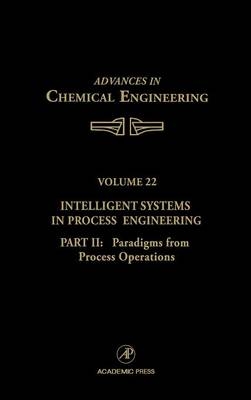
Intelligent Systems in Process Engineering, Part II: Paradigms from Process Operations
Academic Press Inc (Verlag)
978-0-12-008522-4 (ISBN)
- Titel ist leider vergriffen;
keine Neuauflage - Artikel merken
Volumes 21 and 22 of Advances in Chemical Engineering contain ten prototypical paradigms which integrate ideas and methodologies from artificial intelligence with those from operations research, estimation andcontrol theory, and statistics. Each paradigm has been constructed around an engineering problem, e.g. product design, process design, process operations monitoring, planning, scheduling, or control. Along with the engineering problem, each paradigm advances a specific methodological theme from AI, such as: modeling languages; automation in design; symbolic and quantitative reasoning; inductive and deductive reasoning; searching spaces of discrete solutions; non-monotonic reasoning; analogical learning;empirical learning through neural networks; reasoning in time; and logic in numerical computing. Together the ten paradigms of the two volumes indicate how computers can expand the scope, type, and amount of knowledge that can be articulated and used in solving a broad range of engineering problems.
Gregory Stephanopoulos is a Professor of Chemical Engineering at MIT. He received his B.S. from the National Technical University of Athens, his M.S. from the University of Florida and his Ph.D. from the University of Minnesota, all in Chemical Engineering. Upon graduation, he joined the Chemical Engineering Faculty of the California Institute of Technology, where he served as Assistant and Associate Professor until 1985. In 1985 he was appointed Professor of Chemical Engineering at MIT where he has been ever since.Stephanopoulos' work has appeared in more than 150 publications and 7 patents. He has been recognized with the Dreyfus Foundation Teacher Scholar Award (1982), Excellence in Teaching Award (1984), and Technical Achievement Award of the AIChE (1984). He has been a Presidential Young Investigator and the Chairman of the Food Pharmaceutical & Bioengineering Division of the American Institute of Chemical Engineers (1992). In 1992 he was a Visiting Professor at the International Research Center for Biotechnology at Osaka University and was elected a Founding Fellow of the American Institute for Medical and Biological Engineering. In 1996 he chaired the first Conference on Metabolic Engineering and gave the inaugural Bayer Lecture on Biochemical Engineering at the University of California at Berkeley. He was honored with the FPBE Division Award at AIChE in 1997.
C. Han, R. Lakshmanan, B.R. Bakshi, and G. Stephanopoulos, Nonmonotonic Reasoning: The Synthesis of Operating Procedures in Chemical Plants. P.M. Saraiva, Inductive and Analogic Learning: Data-Driven Improvement ofProcess Operations. A. Koulouris, B.R. Bakshi, and G. Stephanopoulos, Empirical Learning through Neural Networks: The Wave-Net Solution. B.R. Bakshi and G. Stephanopoulos, Reasoning in Time: Modeling, Analysis, and Pattern Recognition of Temporal Process Trends. M.J. Realff, Intelligence in Numerical Computing: Improving Batch Scheduling Algorithms through Explanation-Based Learning. References. Subject Index for Volumes 21 &22. Contents of Volumes in this Serial.
| Erscheint lt. Verlag | 14.11.1995 |
|---|---|
| Reihe/Serie | Advances in Chemical Engineering |
| Mitarbeit |
Herausgeber (Serie): John L. Anderson |
| Verlagsort | San Diego |
| Sprache | englisch |
| Maße | 152 x 229 mm |
| Gewicht | 650 g |
| Themenwelt | Informatik ► Theorie / Studium ► Künstliche Intelligenz / Robotik |
| Naturwissenschaften ► Chemie ► Technische Chemie | |
| Technik ► Umwelttechnik / Biotechnologie | |
| Wirtschaft ► Betriebswirtschaft / Management ► Logistik / Produktion | |
| ISBN-10 | 0-12-008522-4 / 0120085224 |
| ISBN-13 | 978-0-12-008522-4 / 9780120085224 |
| Zustand | Neuware |
| Haben Sie eine Frage zum Produkt? |
aus dem Bereich


